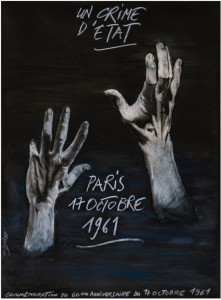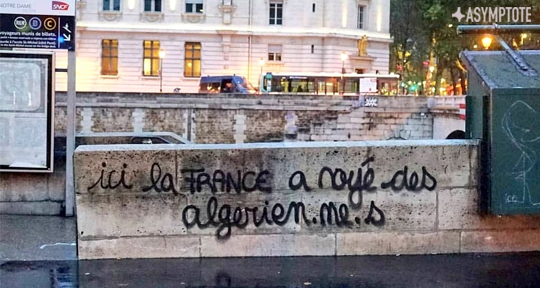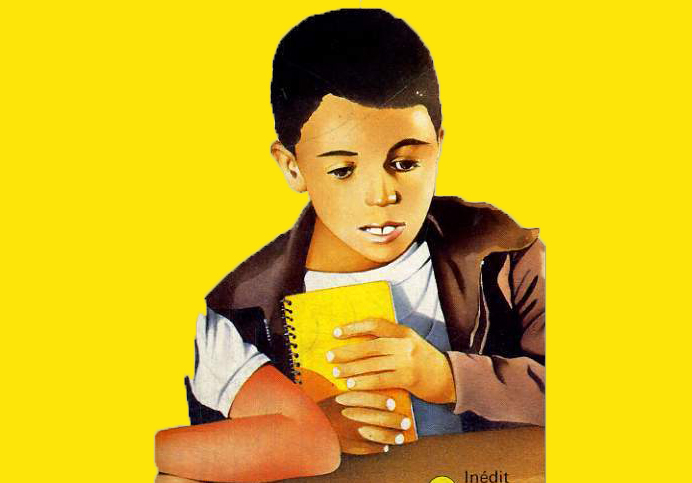This essay is written in memory of all those—predominantly Algerian—killed, deported, or otherwise injured by the violences of French colonialism, and in solidarity with the continuing efforts to resist the forgetting of October 17, 1961 and demand accountability from the French state.
For most of the English-speaking world, October 17 will not register as a date of any consequence. Yet, several days ago in the boulevards of Paris, scores of demonstrators marched from the Rex Cinema to the Pont Saint-Michel; they were tracing, in a defiant act of memory, the cartography of a heinous massacre of Algerian protestors by the French police force that took place, sixty years prior on the very same cobblestones. Their ancestors—most of whom did not survive that deadly evening—had walked those roads in peaceful opposition to the racism and surveillance they had suffered at the hands of the French, as well as the discriminatory night-time curfew that had just been imposed exclusively on Algerian workers.
The publicity posters of this year’s commemorative efforts feature the title “Un Crime d’État” (a crime of the state), handwritten in a ghostly chalk-like texture above two shadowed hands reaching out of murky, watery depths. To the survivors, descendants, relatives, historians, activists, and those who otherwise refuse to forget the bloody police brutality of October 17, 1961, that tableau of desperation will be familiar. On that night, besides beating and injuring countless men, French police officers handcuffed and threw an undocumented number of Algerian demonstrators into the river Seine, leaving them to drown. Historians estimate that around two hundred deaths occurred that night. In an eyewitness account cited in House and MacMaster’s monumental Paris 1961: Algerians, State Terror, and Memory, officers throttled the arms of a man clinging to the parapet “until he dropped like a stone into the river.” Subsequently, nearly six thousand Algerians who did not perish were rounded up, tortured, and deported back to detention camps in Algeria.
Of the scant images that have circulated of 1961, the most iconic is arguably a shot of graffiti spray-painted along the riverbanks, reading “Ici on noie les Algériens” (here we drown Algerians). What’s remarkable is its persistent afterlife in the infinitely reproducible medium of photography, elevated to a sort of metonym for Algerians’ collective trauma—despite the actual graffiti having been literally whitewashed out of existence not long after its writing. Street art continues to spring up here and there: a telling instance is “Ici la France a noyé des Algérien(nes)” (here France drowned Algerians), shifting the temporal frame of reference and naming the locus of guilt. Or, more recently: “Nous sommes les descendants des algériens que vous n’avez pas noyé . . .” (we are the descendants of the Algerians that you did not drown).

The state’s erasure of the incriminating graffiti emblematises an essential hypocrisy upon which France’s modernity is built, and perhaps no colony has borne the brunt more painfully than Algeria. It was there, during its struggle for independence from 1954 to 1962, that the French government engaged in one of its most violent and cruel wars while native peoples agitated for decolonisation. Yet the metropolitan French press, largely indifferent to what was transpiring across the Mediterranean, referred to the widespread killings, bombardments, and torture euphemistically as “the events.” Only in 1999—a full thirty-seven years after Algeria gained independence—did France officially bring itself to acknowledge that a “war” had occurred. READ MORE…


